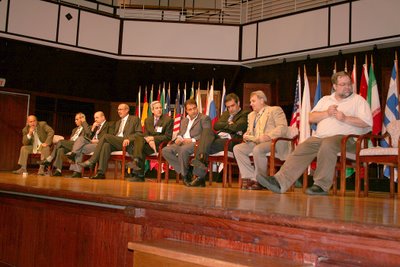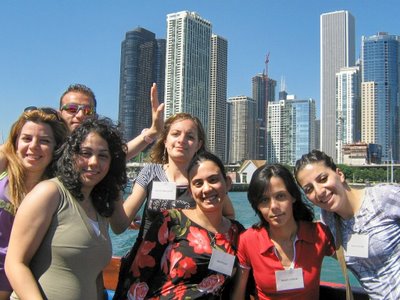As we have seen lately, sometimes a difficult job can get a lot worse.
To help these mayors, the State Department brought several to the United States for three weeks in July to learn how American government works at its most basic level. The program showed them up-close the operations of local government, best practices employed by successful municipal officials, and innovative approaches to community outreach. The State Department calls this "public diplomacy" ——winning the hearts and minds of people around the world.


The trip in July could hardly have come at a worse time. In the end, four West Bank and two Israeli mayors remained for the full duration of the program (six Palestinians and five Israelis were selected). While in Central Indiana, the mayors met with officials from the medium-sized town of Greenwood and attended a roundtable discussion with small-town mayors from the Indiana Association of Cities and Towns. They met top Indiana government officials and the head of the state’s Republican Party. The mayors sat in on a session of the City-County Council of Indianapolis and Marion County and chatted with the city’s top economic development policymakers. And they met with two of the series of exceptional mayors who have led Indianapolis over the past three decades: former mayor Steve Goldsmith and current mayor Bart Peterson.
With just a few days’ notice, on July 20 more than 275 people attended a forum of the mayors at the University of Indianapolis. Joining were more than forty students from Mar Elias University in Galilee who are spending the summer at their school’s partner, the University of Indianapolis. The Mar Elias students symbolize the fragile promise of Israel’s Arab minority as well as the increasing global reach of small American colleges such as University of Indianapolis.

Provocate was invited to moderate the discussion. The mayors began by answering: Who are you, and what is special about the town you come from?
Walid Ahmad Issa Abbadi from Ya’bad in the West Bank was a civil engineer who became mayor in 2004. Ya’bad’s challenge is relying on revenue from coal and tobacco, both of which contribute to high levels of pollution.
Hani Abdalmashi, mayor of Beit Sahour in the West Bank, reports that Christians and Muslims live in harmony in his town (where angels told shepherds of the birth of Jesus). He boasts that his town most adamantly “refused to submit” to the Israelis during the first Intifada.
Ibrahim Jaffal of Abu Dees in the West Bank was a school principal before becoming mayor. His town, he says, used to be one of the wealthiest in Palestine, until 80 percent of the land was confiscated by the Israelis; now it is among the poorest.
Yaron Ben-Nun is mayor of Gedera, a prosperous town in the center of Israel.
Okab Daraghma, mayor of Tubas in the West Bank, is a civil engineer who has an MBA. His town possesses a university and a medical school.
Meir Dahan’s Mazkeret-Batya in Israel was founded by Russian immigrants more than a century ago. He was a journalist before becoming mayor.
The mayor’s second set of questions was trickier: Was it difficult to be around each other for such a long time during this trip? Have you found any common ground?
Some gave answers familiar to anyone who talks to Palestinians. Abdelmashi (Beit Sahour): “It is important for Israelis to know that we are not a people who practice terrorism, and we deserve more than a one-sided life. We deserve universal rights, liberty, and the establishment of a Palestinian state according to the borders of 1967 and the enforcement of UN statements regarding refugees. If we can agree on these principles, we will have gone a long way towards peace.”
Others mentioned initial misgivings and tensions that diminished over time. Abbadi (Ya’bad): “Meeting with the Israelis was a little hard. Then each of us revealed to each other our hardships. … Frankness in and of itself is good, as is understanding hardships.” Dahan (Mazkeret-Batya): “Initially, being with the Palestinians wasn’t so much fun. When we left Israel, the Middle East was more or less quiet. Later, [when tensions escalated after the kidnapping of the Israeli soldier] it became even less pleasant. Then we quickly learned to like each other—and even love each other. Today, we learned the names each other’s kids. We also learned to laugh at each other.”
Most agreed that the job-related challenges they face as mayors provide a common bond. Jaffal (Abu Dees): “We all have on our shoulders running the daily affairs of people. … We can promote peace in our own way. There is no problem between us as mayors. We are friends.” Ben-Nun (Gedera): It is important to have “understanding and a desire to understand the other side of the coin. … All mayors all over the world are dealing with the same problems.” Daraghma (Tubas): “I think sometime or another we have to talk to each other. … I think we have established mutual understanding for each other… We will leave larger governments to do what they will on their parts; but for us, we will promote peace.”
The final set of questions may have been most important: What are the toughest challenges waiting for you at home, and what can we Hoosiers do to help?
Abdelmashi (Beit Sahour): “People think the mayor has a magic wand. Sixty percent of the people in Beit Sahour are unemployed. There are lots of debts and a lot of demand on the healthcare system. The farmers have trouble moving from city to city because of the roadblocks. … How can we make it? How can we pull though? I don’t know.”
Abbadi (Ya’bad): “In the West Bank and in Palestine in general, resources are limited. In my city, we have no electricity. We have generators, but the cost is very high. This is a challenge that faced my city when I left and will face my city when I return.”
Daraghma (Tubas): “We all have the same problems: to deliver services with a lack of resources … I have not been able to pay my town’s officials for months … The business environment in places like this is not encouraging for investors.”
Jaffal (Abu Dees): Seventy-eight percent of the children in his town recently scored exceptionally well on the national standardized exam. “How can I find scholarships for these kids, one of which is my own daughter? … We certainly hope that the Palestinian people are not punished for exercising their rights for democracy.”
Dahan (Mazkeret-Batya): “I’m more modest in my request. All I’m asking for is your understanding of my people. Mr. Daraghma and I [he grabs Mr. Daraghma’s forearm] plan to join together to create a garden for Israeli and Palestinian children called the Garden of Peace. We need your help in building this park to promote peace.”
How should we assess the mayor’s various requests for help?
Idea# 1: Allowing Palestinian people to live and work in dignity.
Most Hoosiers would sympathize with Mr. Abdelmashi’s request and Palestinian support for extremists would surely shrink if it were met. Many Indiana residents travel to the West Bank and Gaza to protest on behalf of Palestinians’ rights (in the process alienating many local Jews, who believe loud pro-Palestinian positions border on being anti-Israel and ignore critical complexities). In the end, dismantling roadblocks and complying with international law is the job of the Israeli national government and remains outside the influence of most Hoosiers.
Idea# 2: Purchasing a power generator.
Uninterrupted electricity would make life more livable for West Bank residents, should help the local economy, and (insofar as residents blame Israel for their troubles) could defuse a source of anger. Hoosiers could easily afford to purchase a generator for Ya’bad. Determining the appropriate technology would require some research, a task for which Indiana’s world-class engineering institutions are well-qualified. But simply giving Ya’bad an electricity generator might not address a more persistent of discontent: the belief that Israel refuses to take the Palestinians’ needs seriously.
Idea# 3: Improving the investment climate by paying back-salaries for Palestinian civil servants.
Many economic development specialists see “poverty trap”: without competent and properly compensated government officials, property rights are unlikely to be enforced; without secure property rights, no one will invest; without investment, the economy will not produce enough to pay properly trained and motivated officials. Paying back-salaries for civil servants could jump start a “virtuous cycle” of economic growth. But virtuous cycles take time to get rolling, and in this case probably require training as well. If Palestinians blame Israel for their poverty, seeing themselves as recipients of Hoosier charity could leave unchanged the sense of oppression that fuels support for extremism. Paying salaries of civil servants also could run afoul of US restrictions on providing support for Hamas and other extremist groups.
Idea #4: Providing increased educational chances for Palestinian students.
Could the opportunities Arab Israeli students from Mar Elias be extended to promising Palestinians? Perhaps Hoosiers could fund scholarships for Palestinians to study at the university in Tubas. Or, more ambitiously, could they establish scholarships to study at the University of Indianapolis or another of the state’s many other fine institutions of higher education? Attracting talented college students would be a win for Indiana’s economy, and a win for American public diplomacy ... but would it be a win for the Middle East? It might be best for gifted Palestinian youths to study with Jewish Israelis, as well as Hoosiers.
Idea #5: Helping Palestinians and Israelis build a Garden of Peace.
Building a park in Tubas may seem to trivialize the terrible problems facing the region, a band-aid for multiple bleeding wounds. But it would not be trivial to the children of Tubas, or to the Israelis of Mazkeret-Batya who help fund and construct the park. Or to the Hoosiers who would be part of the process. Four Indiana Hoosier companies do manufacture playground equipment. But making this modest ——yet doable ——initiative work would require listening to Israelis and Palestinians; and a well-conceived park would have to be the seed of a much more ambitious effort to redesign much more of an insecure life for the residents of Tubas ... and beyond.



No comments:
Post a Comment